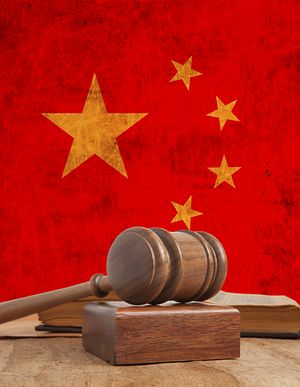China’s highest court unveiled new plans for judicial reform this week, in a move that Xinhua said would help create “a mature socialist court system, one with more independence and less influence and protectionism from local officials.” The reforms are part of Xi Jinping’s vision for a Chinese legal system less open to influence and corruption at the local level, while still beholden to the ultimate authority of the Chinese Communist Party.
The major thrust of the court reforms is to increase judicial independence. The reforms will seek to decrease the influence that local governments have on the court system by changing the way appointments and finances are handled. According to the new plan, judicial selection committees will be established at the provincial level, removing the ability of local governments to promote judges friendly to their interests. Finances of local courts will also be consolidated and handled at the provincial level, reducing the potential for local governments to see fines collected as legal punishment as a source of income.
The reforms also seek to empower judges to rule on cases after hearing them. Currently in China, a judiciary council makes the final ruling on a case rather that the judge who actually presided over the presentation of evidence and witnesses. China is moving to change this — the new reforms would mean that judges can rule on a case without seeking the approval of the judicial council. However, judges won’t be completely independent. As Xinhua notes, judges might still need to work with the council “in some cases.” This reform should be seen as one more incremental step on the way to having judges both try and rule on cases without seeking outside approval.
As the reforms give more power to the judges, it makes sense that China’s government would seek to create more professional model for the judiciary. At the Supreme People’s Court Monitor, Susan Finder notes that the overall goal of the reforms is “to step away from the traditional model of judges as cadres,” instead creating a specialized judicial force. The reforms look to slowly separate administrative and management tasks from the judiciary proper, with its own system of performance evaluations and promotions. The provincial selection committees mentioned above are also supposed to promote the professional selection of judges.
Along with this, the reforms also suggest setting up special tribunals for the hearing of intellectual property cases and environmental cases, which require more specific expertise from their judges. Interestingly, Xinhua’s coverage of the new reforms focused heavily on the ramifications for environmental law. In an interview with He Xiaorong, head of the Reform Office at the Supreme People’s Court, Xinhua highlights how the reforms would prevent polluting companies from avoiding legal repercussions. “Special interests have been especially pronounced when it comes to environmental issues,” he told Xinhua.
The emphasis on environmental protection in an article on judiciary reform underscores how interconnected all of China’s various reform efforts are. Protecting the environment will require a court system immune to influence from local governments and businesses. Establishing such a judicial system requires an ability to reduce power at the local level and consolidate it in the hands of provincial and central authorities — an effort which is also crucial for seeing through the implementation of economic restructuring.
































